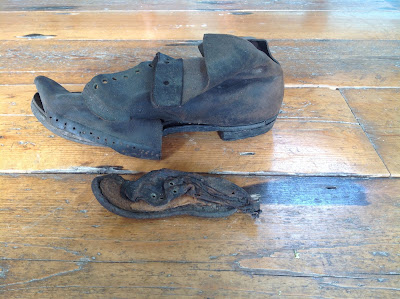National Famine Commemoration Day
The 16-17 May is National Famine
Commemoration Day, a time to remember all of those who died and suffered loss
during An Gorta Mór. Normally, schools and sporting events would observe
a minute's silence, but this year the commemoration will be observed in a more
individual and personal way. Whatever the manner, it is important to reflect, remember, and honour those who died, and those who left Ireland to start a new life in
another country.
The following are reports
from newspapers reporting on conditions during ‘Black 47’.
We have again to make known to
the public the devastating effects of famine, which is now carrying off by
hundreds and thousands the doomed population of this country.
The Nation, 26 January
1847
From every quarter of the
country, we are literally besieged with the heart-rending particulars of the
progress of famine. A respectable correspondent in the neighbourhood of
Kilconly has communicated to us the loss of no less than eighteen lives from
want and destitution! And this occurring in a few short days!
The Nation quoting
the Tuam Herald, 13 February 1847.
Diocese of Clonfert –
Prayers against the famine. Our most Holy Father Pius IX in his paternal solicitude
for the spiritual and temporal welfare of the faithful, has ordered to be
offered up in the capital of the Christian world, a Tridium or three days public
prayer in hopes to appease the anger of Almighty God and implore Him to avert
the awful famine which is now desolating a great portion of the empire.
Two men have died of want –
one by the wayside as he was returning from the public works where since the
dismissal of the twenty percent, he struggled to labour, although he and six
others were reduced to live on the scanty supply of food purchased for ten
pence a day; the other died of pure exhaustion from illness and want – report
from Cashel District.
The Nation, 17
April 1847
This disease is the result
of insufficient nutrition and its victims die not the rapid death of
starvation, but slowly and surely as does the healthy succulent plant when
removed from a rich soil to a barren sand.
Irish Examiner, 24
May 1847
The following returns from
Catholic clergymen, relative to the number of persons who have fallen victim to famine and pestilence, and the condition of the country generally … this
parish at present presents a horrid picture of famine … with few exceptions the
people are all beggars receiving outdoor relief, some four days, others every day
in the week from relief committees. The Robinson family of Rich Hill Castlebar
have come forward to the rescue quite admirably. All the landlords, the greater
part absentee, have acted very badly – Rev. Patrick Quinn P.P Kilmore Parish,
Co. Armagh
Freemans Journal, 1
June 1847
Another year of famine is
probably before us, inevitably indeed if we do not guard our produce as we would
life itself – and in its track its unfailing fever will come again to strike
those classes who might defy the famine.
The Nation, 17
July 1847
I have never seen anything
more frightful than the aspect this city [Cork] presented. All its wealthier streets
and places of resort were literally in possession of hordes of the most squalid
and wretched beings that it is possible to conceive - Extract from Frazer’s
Magazine by Rev Trench.
Irish Examiner 21
August 1847
Of these awful occurrences, some
account must be given. Historians and politicians will one day sift and weigh
the conflicting narrations and documents of this lamentable year, and pronounce
with or without affectation, how much is due to the inclemency of heaven and
how much to the cruelty, heartlessness or improvidence of man. The bloated institutions
and spirit of the empire are on trial. They are weighted in the balance. Famine
and pestilence are at the gates.
Nenagh Guardian, reporting
from The Times, 25 September 1847
That her mother had nothing to eat from Tuesday
until Friday, and that there was no food in the house for that time but two pence
worth of sharps and one halfpenny worth of tea, with one halfpenny worth of
sugar - Mary Hogan, daughter to deceased [Widow Hogan], being sworn and deposed
in court, Queens County
The Nation, 9 October 1847
The present population of my
parish is 8,553. About 150 families have been obliged to desert their holdings.
Out of that population scarcely twelve families, including landed proprietors,
have food to sustain themselves until the coming harvest - Rev. P. Lyons, P.P.
Kilmeen.
Freemans Journal, 24
November 1847
How long are we to continue passive
spectators of the misery now so prevalent amongst our poor, and the inevitable
ruin so fast threatening every class of our once flourishing and happy country –
letter to the editor.
Irish Examiner, 29
December 1847




Comments
Post a Comment